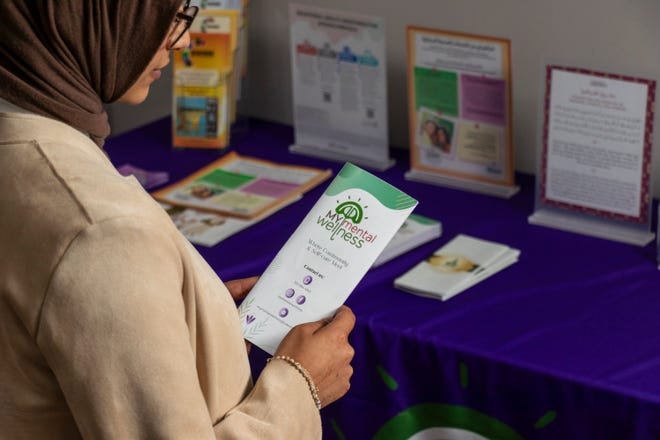When Danish Hasan moved to Dearborn from Chicago in 2023, he became a regular at the Islamic Center of Detroit, a nonprofit community center on Tyreman Avenue.
After the first sermon he attended, he learned about the center’s services: a community food pantry, ESL classes, immigrant assistance and designated mental health therapists.
“I was really intrigued because there’s so much stigma around mental health in the Muslim American community, the Arab American community, the Pakistani American community. But I’ve noticed that especially in communities with Middle Eastern immigrants like Dearborn, people generally have more trust in imams and religious leaders,” Hasan said.
Studies have shown that Muslim Americans experience exponentially higher rates of mental illness and suicide than other religious groups, and an American Psychiatric Association study on mental health disparities among Muslim Americans found that 95% of imams talk to individuals about non-religious topics, such as family and relationship issues, mood and anxiety.

“It’s natural for people to turn to religious leaders in times of need,” Dearborn Public Health Commissioner Ali Abazied said, “but I think faith communities have a responsibility to do more — to recognize that depression, anxiety and substance use disorders are not individual failures.”
Staffing clinics to respond to crisis situations
The imams have noticed an increased demand for counseling on issues of religious discrimination and Islamophobia since 9/11. Understanding the value of addressing mental health issues head-on, the Islamic Center staff founded My Mental Wellness, their own faith-based nonprofit clinic, in 2018. A row of offices is just a few feet from the center’s men’s and women’s prayer rooms, and the quaint lobby is stocked with refreshments and educational handouts in English and Arabic.
Over the years, the clinic has grown its staff from one to five and now includes clinical psychologists, social workers, counselors, program coordinators and Hasan, who was appointed executive director last year. Hasan founded the Tampa Opioid Research Network in 2017 and has more than a decade of experience in nonprofit work and public health.
He said hiring extra staff had helped to provide help as quickly as possible: “When people come to us for help they may be in a crisis and we don’t want them to have to wait weeks or months to be seen.”
My Mental Wellness runs on a combination of grants and donations, and Hasan estimates the clinic serves about 60 clients a month in Arabic or English. All sessions are free and open to the public. The majority of clients are young professionals, with middle and high school students also frequenting the clinic. About a third of the population is over 45 years old. Some clients drive from West Bloomfield and Troy.
“The fact that young people are coming here shows that there are adults in their lives who recognize that this is a child who needs attention. It proves that the community is changing its thinking (on mental health),” Hasan said.
Healing Circles, Marriage Workshops, Parent Support
A report by the Cantonal Institute for Family and Youth Studies found that 55 percent of Muslim students have been bullied because of their religion, which can lead to increased levels of depression, anxiety and behavioral problems.
Sarah Massad, a clinical psychologist with My Mental Wellness, is a longtime Dearborn resident who works particularly well with children and teens, which is what gave her the idea to create a therapy group where high school girls could openly discuss and work through the challenges they face at school and at home.
“There’s a lot of creative freedom here. … I love the energy. And you’re respected as a clinician, regardless of age or gender,” she said.
The clinic offers healing circles, marriage workshops, support groups for parents of children with special needs, and more recently maternal and child health programs, as well as age- and gender-based groups for male youth and adults.
Fostering outside partnerships has allowed the Islamic Center to become a “health information hub,” Hasan said, offering regular health screenings, special needs fairs during the Eid al-Adha holiday and American Sign Language interpretation during Friday prayers.
“ICD is a very vibrant community. We see over 2,000 people for our Friday prayers and our food pantry is open to families every week. We have a mental health clinic located within the Islamic center so it’s naturally very accessible,” Hasan said.
In the future, Hasan envisions continuing to offer free services while billing Medicare and Medicaid plans, and eventually hiring psychiatrists to offer substance abuse treatment while maintaining its core mission of providing faith-based and accessible therapy to metro Detroit residents.
“My philosophy on mental health is simple: Helping one person, you help a family. Helping a family, you help a neighborhood,” Hasan said.
For more information about ICD and the My Mental Wellness clinic,My Mental Wellness Or call 313-584-4143.
This story was produced through the New York & Michigan Solutions Journalism Collaborative, a partnership of news organizations and community groups dedicated to rigorous, compelling reporting about effective responses to social issues. The group is supported by the Solutions Journalism Network. The Collaborative’s Health Equity Solutions Project focuses on potential solutions to challenges in health care.

